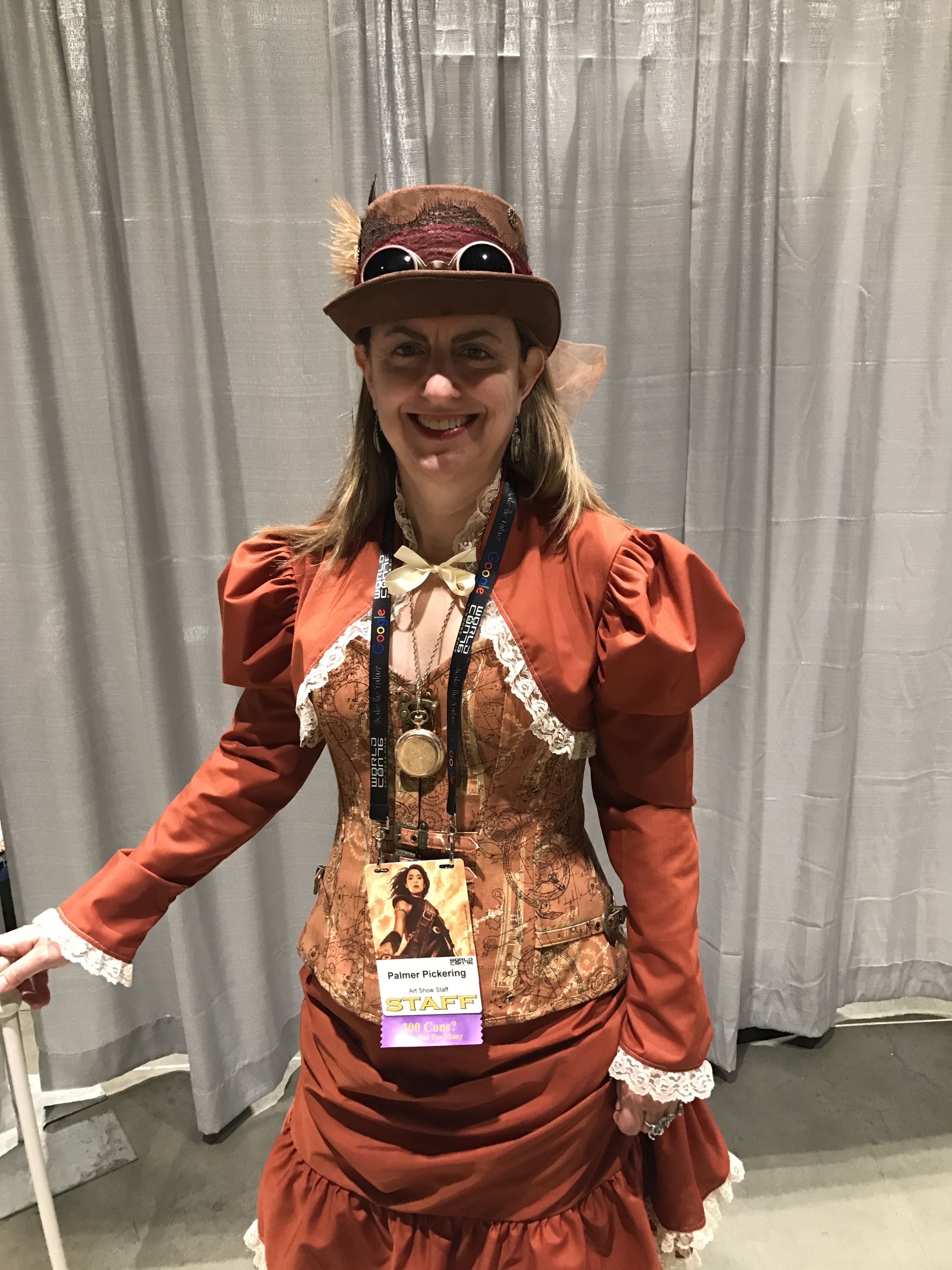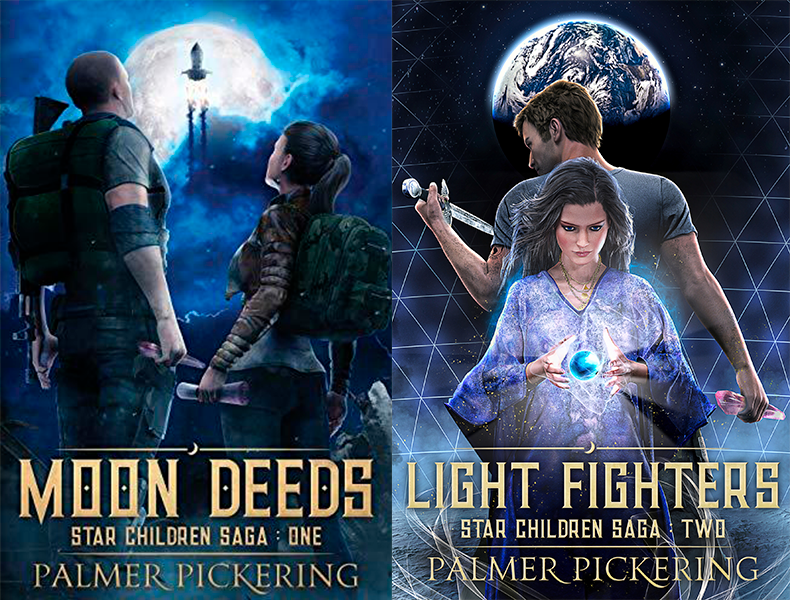March of the Sequels: Palmer Pickering
16 Mar 2023The Author/s

Palmer Pickering
Palmer has been writing fiction since she was eight. She received her BA in American Studies from Wesleyan University, with concentrations in Religion and Race Relations.
She currently works in Silicon Valley in the gaming industry and high tech. In addition, Palmer holds a certificate in Chinese Acupressure, is a certified solar panel installer, and studied Tibetan Buddhism with the 14th Dalai Lama.
She lives and writes in the magical redwood forest of the Santa Cruz Mountains, California.
The Interview
First of all, tell me a little about your series and introduce us to the sequel(s).
The Star Children Saga is the name of the series and starts off with Moon Deeds. The sequel is Light Fighters and was released in 2022. The series is science-fantasy and is epic in scope. The long arc of the series is about a pair of twins on a quest to find our ancestors on a lost planet across the galaxy, in order to save the galaxy from a descent into a permanent dark age. In this world, magic is the only thing more powerful than technology.
The title of book one (and the first trilogy), Moon Deeds, refers to deeds to land parcels on the moon that the main characters inherited. They want to use the deeds to escape an alien-backed world army that is taking over Earth and flee to a lunar colony. The arc of the Moon Deeds trilogy is about the twins claiming their power and defending the moon from the encroaching army, which isn’t satisfied with taking over Earth, but wants to control the gateway to the stars.

Do you find that most of your readers continue to read the whole series? Why do you think that is?
Well, it’s a little mixed. After I released Moon Deeds, which ends on a wicked (and rather obnoxiously abrupt) cliffhanger, people asked me multiple times about the sequel. But I released Light Fighters three years later, so it lost a little momentum. In general, though, people have been reading the sequel and are asking for book three. I have some beta readers who have read drafts all the way through book five, and they are constantly pestering me for more.
How difficult is it to add new characters in a sequel into already established relationships?
I find it quite easy to add new characters. I tend to cycle secondary characters in and out of the story as the main characters proceed on their journey. This happens naturally when the MC’s move on to a new location. Some secondary characters will continue through the entire series, if they are core to the plot or worldbuilding.
Is it difficult to continue with worldbuilding for a world you have already built in book 1? Do you find it easier to switch locations for the sequel and start again with worldbuilding?
For book two, I did not spend as much time worldbuilding in terms of the setting. I presented the locations in more than enough detail in book one, that aside from a few anchoring descriptions, I didn’t spend as much time on descriptions in book two unless we moved to a new location. Light Fighters does expand into new locations, actually, including other planets, and those were fun to build out. In terms of the lore and the underlying series plot, those get expanded much more in book two. I also included a long prologue in Light Fighters from the point of view of the Star People. I will continue the Star People (Turya) prologues in future books–it’s kind of its own book released in serial format, but does tie in closely with events in the main body of the books.
You also have a Sword and Sorcery book, Heliotrope. Could you tell us a little bit more about it?
Heliotrope is a vast departure from the Star Children Saga. I needed a break from the intensity, complexity, and genre mashup of the science-fantasy series. Heliotrope is pure epic fantasy with a single POV character and a relatively simple, linear plot. It was really easy to write and people find it very easy to read, despite its length. The story is about a retired warrior who is called back into service unexpectedly during a coup, and embarks on an epic journey across various kingdoms. Magic systems are slowly introduced and become integral to the plot and character development. There are themes of found family, ancient magic, and animal companions. It’s written in a slow-burn and descriptive-heavy style, similar to Robert Jordan or Robin Hobb in terms of sitting with the characters in their daily lives and immersing the reader in the world. It’s a feel-good book, despite a good dose of blood and gore. It is a standalone, but there may be a follow-on book at some point. The audiobook will be released any day now, with George Guidall narrating it, and I’m working on a hardcover edition as well.
The first book in the series got to SPFBO5 semifinals. How did you feel about it?
SPFBO was a great experience. I love the blog-off format. It’s super fun and was a great way to become more involved in the indie community. My book Moon Deeds placed into the semi-finals in the same group with ML Wang’s Sword of Kaigen – perhaps you’ve heard of it. In any case, I was knocked out of the running by that stellar book.
Have you ever been stymied by a worldbuilding or plot detail from book 1 that is very inconvenient to deal with or write your way around in subsequent books?
Yeah, that’s always a risk, particularly with a long series. I try to plan out the major events, characters, and worlds in advance to try and avoid that, but things happen. I tend to look upon those situations as opportunities to do something interesting. I like problem solving.
Would you say your craft has improved with the subsequent books?
My craft continues to improve with each book, in my opinion. There are definitely weaknesses in the books I have already released, which are even more evident in retrospect. However, publishing the books forced me to take my craft to the next level in many ways. So I was glad I took the risk and published when I did. I think most writers go through an evolution.
Do you have all the timeline planned for the full series?
Yes, I pretty much have the entire series planned out. There are some gaps in the later books that I haven’t figured out yet, but the ending is pretty clear. Now it’s just a matter of getting the time to put it all down on paper. I am struggling a bit with book three, however, which is called Anaximenes. We’ll see what comes of that one. I know how it ends, but getting there is a challenge right now.
Do you have any marketing tips for sequels?
Well, in my case, since I released book two so long after book one, I just basically remarketed book one all over again. Since it ends on such a cliffhanger, book two basically markets itself. Either people want to read more, or they don’t. Light Fighters is more fast-paced than Moon Deeds, and a bit of a nail-biter, with a much darker tone.
Some disadvantages to marketing a book later in a series is you can’t enter later books in contests, and giving too much description can get into spoiler territory pretty quickly. So, the big marketing tip is to make book one really compelling.
